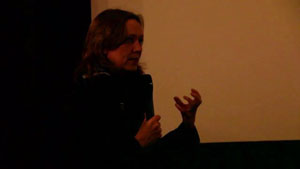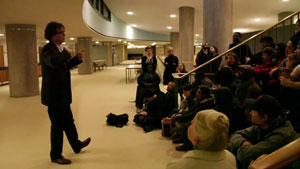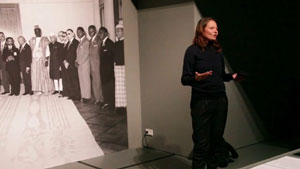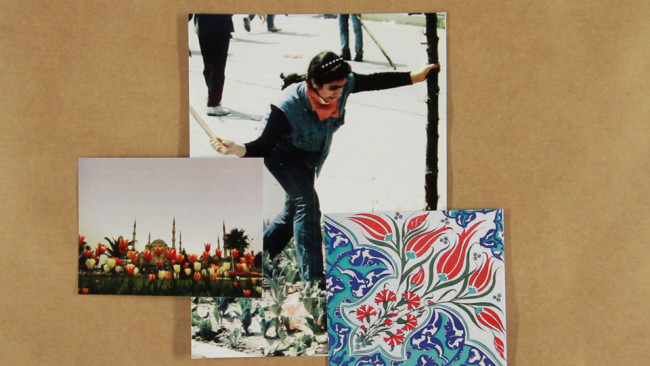20. November 2013 / Acting Archives, Marathon ⟶
Archives Works Marathon, Tag 1
mit Beiträgen von
Salem Mekuria, Doreen Mende, Aykan Safoǧlu, Bernd Scherer, Stefanie Schulte Strathaus
Bus Tour / Besuch Berliner Institutionen
Haus der Kulturen der Welt: After Year Zero. Geografien der Kollaboration seit 1945. Einführung von Bernd Scherer. Gespräch mit Doreen Mende über das Projekt „Travelling Communiqué. Reading a Photo Archive (1948-1980)“ Arsenal – Institut für Film und Videokunst: Gespräch mit Stefanie Schulte Strathaus über die Projekte „Living Archive“ und „Visionary Archive“
Film Screening
Aykan Safoǧlu: Off-White Tulips, 2013 Salem Mekuria: Ye Wonz Maibel: Deluge, 1996/97

Stefanie Schulte Strathaus
Stefanie Schulte Strathaus presents the history of the Arsenal Institute for Film and Video Art, its beginnings as an institution, and the need for such an institution in Berlin. Several issues are raised in discussion about the politics of maintaining a film archive, especially in relation to its own collection and to the city that houses it. Two projects are highlighted, The Living Archive and The Visionary Archive, collaborations that have resulted from projects with a number of practitioners and other archives from around the world.
Synthesis
Arsenal Institute for Film and Video Art • Berlin Film Festival • Archive of 10,000 films • The films in Arsenal’s archive have only one purpose: to be shown • Anthology Film Archives in New York • Ausklappen...
Arsenal Institute for Film and Video Art • Berlin Film Festival • Archive of 10,000 films • The films in Arsenal’s archive have only one purpose: to be shown • Anthology Film Archives in New York • Started as association called Freunde der Deutsche Kinemathek • No alternative cinema in Germany in the 60s • An important aspect of Arsenal was the combination of film history with contemporary film practice • Lionel Rogosim – film Come Back Africa: the first film in the archive, the basis of the collection and the beginning of distribution • Michael Verhoeven – film OK • The start of the Forum of Young Cinema • International films first collected at the initiative of the festival to subtitle them • Films sent from countries under military dictatorships • What to do with old print vs. DVD? • Old prints get vinegar syndrome • Too costly to digitise everything • Films are not categorised in the collection • The Living Archive project • Many of the films exist only in this collection • Archive as a practice: archiving films, curating films, restoring films, showing films • Opening an archive is not threatening an archive • Avi Mograbi and Angela Melitopoulos in The Living Archive project • The Visionary Archive • Attempting to run an institution without being an institution • Erika and Ulrich Gregor are still part of Arsenal • Preserving the memory of the institution itself • The Living Archive attracted partners from other countries • Filmmaker Gadalla Gubara • Guinea Bissau and Egypt forming film archives • The Visionary Archive works with these emerging archives • Restoration also part of the institution’s work
Short biography
Stefanie Schulte Strathaus, film and video curator, co-director of the Arsenal Institute for Film and Video Art, member of the selection committee of the Berlinale Forum, Ausklappen...
Stefanie Schulte Strathaus, film and video curator, co-director of the Arsenal Institute for Film and Video Art, member of the selection committee of the Berlinale Forum, and founding director of Forum Expanded, a section of the Berlin International Film Festival that negotiates the boundaries of cinema. Her curatorial work comprises numerous film programmes, retrospectives, and exhibitions, among them The Living Archive – Archive Work as a Contemporary Artistic and Curatorial Practice.
Stefanie Schulte Strathaus stellt die Geschichte des Arsenal – Institut für Film und Videokunst vor und spricht über die Notwendigkeit einer solchen Institution in Berlin. Die Diskussion berührt folgende Aspekte: die politischen Rahmenbedingungen für die Pflege eines Filmarchivs, die Bedeutung der eigenen Filmsammlung und die Rolle des Archivs für die Stadt Berlin. Zwei Projekte werden insbesondere erwähnt, The Living Archive und The Visionary Archive; beide involvieren Beteiligte und verschiedene andere Archive weltweit.
Synthese
Arsenal Institute for Film and Video Art • Berlinale • Archiv mit 10,000 Filmen • Die Filme im Archiv des Arsenal haben nur einen einzigen Zweck: Gezeigt zu werden • Anthology Film Archives in New York • Ausklappen...
Arsenal Institute for Film and Video Art • Berlinale • Archiv mit 10,000 Filmen • Die Filme im Archiv des Arsenal haben nur einen einzigen Zweck: Gezeigt zu werden • Anthology Film Archives in New York • Entwickelte sich aus einem Verband namens Freunde der Deutsche Kinemathek • In den 1960er Jahren gab es kein alternatives Kino in Deutschland • Wichtiger Aspekt des Arsenal war die Kombination aus Filmgeschichte mit zeitgenössischen Filmpraktiken • Lionel Rogosim – Film Come Back Africa: Erster Film im Archiv, Grundlage der Sammlung und Ausgangspunkt des Vertriebs • Michael Verhoeven – Film OK • Beginn des Forum of Young Cinema • Internationale Filme wurden zuerst auf Initiative des Festivals gesammelt um sie mit Untertiteln zu versehen • Filme aus Ländern mit Militärzensur erhalten • Was tun mit alten Filmrollen vs. DVD? • Alte Filme bekommen Essig-Syndrom • Zu kostspielig alles zu digitalisieren • Filme in der Sammlung sind nicht kategorisiert • The Living Archive Projekt • Viele Filme existieren nur in der Sammlung • Archive als Praxis: Filme archivieren, kuratieren, restaurieren und zeigen • Ein Archiv eröffnen ist keine Bedrohung für Archive • Avi Mograbi und Angela Melitopoulos im The Living Archive Projekt • The Visionary Archive • Versuch eine Institution zu führen ohne eine Institution zu sein • Erika und Ulrich Gregor sind immer noch Teil des Arsenal • Das Andenken an die Einrichtung selbst erhalten • The Living Archive lockt Partner aus anderen Ländern an • Filmemacher Gadalla Gubara • Guinea Bissau und Ägypten begründen Filmarchive • The Visionary Archive arbeitet mit diesen entstehenden Archiven • Restauration ist auch Teil der Arbeit des Archivs
Kurzbiografie
Stefanie Schulte Strathaus, Film- und Videokuratorin, Co-Direktorin des Arsenal - Institut für Film- und Videokunst, Mitglied des Auswahlkommittees des Berlinale Forums Ausklappen...
Stefanie Schulte Strathaus, Film- und Videokuratorin, Co-Direktorin des Arsenal - Institut für Film- und Videokunst, Mitglied des Auswahlkommittees des Berlinale Forums und Gründerin und Leiterin des Forum Expanded, einem Bereich des Berlin International Film Festivals, der die Grenzen des Kinos auslotet. Ihre kuratorische Arbeit umfasst zahlreiche Filmprogramme, Retrospektiven und Ausstellungen, unter anderem The Living Archive – Archive Work as a Contemporary Artistic and Curatorial Practice.

Bernd Scherer
Bernd Scherer presents a brief history of the Haus der Kulturen der Welt (HKW) and speaks of the different projects that the HKW is producing in collaboration with curators, artists, and other practitioners from around the world. The discussion focuses on the role that the HKW has played and how it is reconfiguring itself for the future.
Synthesis
HKW was a gift from the United States to the city of Berlin in 1957 • A symbolic locale in Cold War Berlin • First sign of the West when crossing over from East Berlin • Ausklappen...
HKW was a gift from the United States to the city of Berlin in 1957 • A symbolic locale in Cold War Berlin • First sign of the West when crossing over from East Berlin • Criticism that the HKW was a realm or space defined by the ‘exotic’ • It also played a transmitter role for quite a number of intellectuals and artists • Post-colonial discourse – Homi K. Bhabha, Okwui Enwezor, the Short Century • The Black Atlantic with Paul Gilroy • Third phase of the HKW seeks to encourage an interaction between local and global discourse • What is art, and what are art institutions doing? • The reconceptualisation of the HKW • Global Prayers – working together with academics, artists, and cultural and social activists in cities such as Berlin, Rio de Janeiro, Lagos, Beirut, Istanbul, and Mumbai • Processes of modernisation and secularisation involve removing religion from the picture • 80 researchers in these cities, with different artists • Artist Aernout Mik • The border between scientific and artistic approaches • German Research Foundation (DFG) starting to support workshops in order to develop a conceptual approach to these issues • Whole Earth • How counterculture transforms into big business • After Year Zero • Cultural and political movements in the non-western world
Short biography
Bernd Scherer, director of the Haus der Kulturen der Welt (HKW), holds a doctoral degree in philosophy from the Universität des Saarlandes Ausklappen...
Bernd Scherer, director of the Haus der Kulturen der Welt (HKW), holds a doctoral degree in philosophy from the Universität des Saarlandes and is the author of several publications focusing on aesthetics and international cultural exchange. Previously, he headed the Department of Humanities and Culture at the HKW and has also served as its Deputy Director. He served as Director of the Goethe Institute Mexico from 1999 through 2004 and subsequently as Director of the Arts Department at the Goethe Institute’s headquarters in Munich.
Bernd Scherer spricht über die Geschichte des Haus der Kulturen der Welt (HKW) und verschiedene Projekte die das HKW in Zusammenarbeit mit Kuratoren, Künstlern und anderen internationalen Teilnehmern produziert. Die Diskussion konzentriert sich auf die Rolle des HKW in der Vergangenheit und wo es sich zukünftig sieht.
Synthese
HKW war ein Geschenk der USA an die Stadt Berlin im Jahr 1957 • Ein symbolischer Ort im Berlin des kalten Krieges • Erstes Zeichen des Westens wenn man aus Ostberlin kam • Ausklappen...
HKW war ein Geschenk der USA an die Stadt Berlin im Jahr 1957 • Ein symbolischer Ort im Berlin des kalten Krieges • Erstes Zeichen des Westens wenn man aus Ostberlin kam • Kritik am HKW als Ort, der auf das Exotische setzt • Spielte eine Vermittlerrolle für Intellektuelle und Künstler • Postkolonialer Diskurs – Homi K. Bhabha, Okwui Enwezor • The Short Century • The Black Atlantic mit Paul Gilroy • Dritte Phase des HKW hat zum Ziel, einen Austausch zwischen dem Globalen und dem Lokalen zu ermöglichen • Was ist Kunst und was tun Kunsteinrichtungen? • Global Prayers – Zusammenarbeit mit Wissenschaftlern, Künstlern sowie kulturellen und sozialen Aktivisten in Städten wie Berlin, Rio de Janeiro, Lagos, Beirut, Istanbul und Mumbai • Modernisierungsprozesse und Säkularisierung haben zu Folge, dass die Religion aus dem Blickwinkel verschwindet • 80 Forscher und Künstler in diesen Städten • Künstler Aernout Mik • Die Grenze zwischen wissenschaftlichem und künstlerischem Ansatz • Deutsche Forschungsgemeinschaft beginnt Workshops zu unterstützen um einen konzeptuellen Ansatz zu diesen Fragen zu entwickeln • Whole Earth • Wie verwandelt sich eine kulturelle Opposition in "Big Business"?• After Year Zero • Kulturelle und politische Bewegungen außerhalb der westlichen Welt
Kurzbiografie
Bernd Scherer, Leiter des Haus der Kulturen der Welt erhielt seinen Doktor in Philosophie von der Universität des Saarlandes Ausklappen...
Bernd Scherer, Leiter des Haus der Kulturen der Welt erhielt seinen Doktor in Philosophie von der Universität des Saarlandes und ist Autor mehrerer Publikationen zu Ästhetik und internationalem kulturellen Austausch. Zuvor leitete er die Abteilung für Geisteswissenschaften und Kultur am HKW und war stellvertretender Leiter des Hauses. Von 1999 bis 2004 leitete er das Goethe Institut Mexiko und arbeitete danach als Leiter der Abteilung für Kunst in der Zentrale des Goethe-Institutes in München.

Doreen Mende
Doreen Mende presents her work related to the Travelling Communiqué project in collaboration with the Haus der Kulturen der Welt (HKW) and the Museum of Yugoslav History. This work focuses on photo archives, including the presidential press service archive of Tito. The project, which explores the Yugoslav perspective on the Non-Aligned Movement, raises many issues, such as globalisation, politics of inclusion, the use of images in political movements, and colonialism.
Synthesis
Travelling Communiqué • HKW • Long-term, collaborative research project • Artist Milica Tomić • Museum of Yugoslav History • The presidential press service archive of Tito • The Otolith Group • Ausklappen...
Travelling Communiqué • HKW • Long term, collaborative research project • Artist Milica Tomic • Museum of Yugoslav History • The presidential press service archive of Tito • The Otolith Group • The Dutch Art Institute • The Non-Aligned Movement, its first conference in Belgrade from September 1–5, 1961 • Why deal with this topic in an era of globalisation • Politics of inclusion by a condition of permanent war • Tito’s affinity with images • Tito’s construction of a cinema in the Museum of Yugoslav History • Image production a crucial instrument of militant cinema vs. an instrument to continue an independence movement • How can we make use of this archival material in the context of the HKW? • Interventions into the historical material • What could be the Ethiopian horizon in the Non-Aligned Movement? • The first conference of the African Union in 1963 • The film Blood Is Not Fresh Water – suggesting a way of reading history through different culture rituals • Different concepts of history • The document as a historical indication of a moment • The inner split that appears or emerges in the figure of Tito • The ambivalent or paradoxical situation between independence movement and structure of the state • The impact colonialism had on the particular countries on the African continent • We are not working only with the archive presidential press service • Relating to these historical moments via images, speeches, and films • The Non-Aligned Movement still going today – hosted by Iran • This power or force is not like the master plan for a new world order or for another universalism
Short biography
Doreen Mende, curator interested in theoretical and practical issues of exhibiting with regard to space and geopolitics. Ausklappen...
Doreen Mende, curator interested in theoretical and practical issues of exhibiting with regard to space and geopolitics. In 2011, she was a fellow of the Arab Image Foundation in Beirut. She completed her practice-based PhD at Goldsmiths in 2013. She is co-founder of the publication series Displayer at HfG/ZKM in Karlsruhe and currently teaches at the Dutch Art Institute. With Milica Tomic, Armin Linke, and other authors, she is currently working on the project Travelling Communiqué, which discusses the topicalities of the Yugoslav Presidential Press Service / Photo Section in Belgrade during Tito’s presidency from 1948 to 1980.
Doreen Mende präsentiert ihre Arbeit die im Rahmen des Travelling Communiqué Projektes in Zusammenarbeit mit dem Haus der Kulturen der Welt (HKW) und dem Museum für Jugoslawische Geschichte entstanden ist. Diese Arbeit beschäftigt sich mit Fotoarchiven, so auch dem präsidentiellen Pressedienstarchiv unter Tito. Das Projekt untersucht die jugoslawische Perspektive der Bewegung der blockfreien Staaten und stellt Fragen u.a. zu Globalisierung, Inklusionspolitik, der Verwendung von Bildern in politischen Bewegungen und zu Kolonialismus.
Synthese
Travelling Communiqué • HKW • Auf lange Zeit angelegtes kollaboratives Forschungsprojekt • Künstlerin Milica Tomić • Museum of Yugoslav History • Das präsidentielle Pressebildarchiv unter Tito • The Otolith Group • Ausklappen...
Travelling Communiqué • HKW • Auf lange Zeit angelegtes kollaboratives Forschungsprojekt • Künstlerin Milica Tomic • Museum of Yugoslav History • Das präsidentielle Pressebildarchiv unter Tito • The Otolith Group • The Dutch Art Institute • Bewegung der blockfreien Staaten, sowie dessen erste Konferenz in Belgrad vom 1. bis 5. September 1961 • Warum sollte man sich mit diesem Thema während einer Zeit der Globalisierung befassen? • Politik der Inklusion durch einen permanenten Kriegszustand • Titos Affinität zu Bildern • Titos Bau eines Kinos im Museum für jugoslawische Geschichte • Bildproduktion als wichtiges Element eines militanten Kinos vs. als ein Instrument mit dem eine unabhängige Bewegung fortgeführt wird • Wie können wir dieses Archivmaterial im Rahmen des HWK nutzen? • Interventionen im historischen Material • Was könnte der äthiopische Horizon innerhalb der Bewegung der blockfreien Staaten sein? • Die erste Konferenz der Afrikanischen Union im Jahr 1963 • Der Film Blood Is Not Fresh Water – Vorschlag einer historischen Lesart durch kulturspezifische Rituale • Verschiedene Geschichtskonzepte • Dokumente als historische Indikatoren eines Moments • Die innere Zerrissenheit, die sich in der Figur von Tito zeigt • Die Ambivalenz oder paradoxe Situation zwischen unabhängigen Bewegungen und der staatlicher Struktur • Der Einfluss des Kolonialismus auf spezifische Länder des afrikanischen Kontinentes • Wir arbeiten nicht ausschließlich mit dem Archiv des präsidentiellen Pressedienstes • Sich auf diese historischen Momente durch Bilder, Rede und Film beziehen • Die Bewegung der blockfreien Staaten existiert auch heute noch – mit dem Gastgeber Iran • Diese Macht oder Kraft ist nicht gleichsetzbar mit einem Masterplan für eine neue Weltordnung oder einen anderen Universalismus
Kurzbiografie
Doreen Mende, Kuratorin, interessiert sich für praktische und theoretische Ausstellungsaspekte mit Fokus auf Raum und Geopolitik. Ausklappen...
Doreen Mende, Kuratorin, interessiert sich für praktische und theoretische Ausstellungsaspekte mit Fokus auf Raum und Geopolitik. Im Jahr 2011 war sie Fellow der Arab Image Foundation in Beirut. Im Jahr 2013 schloss sie einen praktischen PhD am Goldsmiths College London ab. Sie ist Mitbegründerin der Publikationsreihe Displayer an der HfG/ZKM in Karlsruhe und unterrichtet momentan am Dutch Art Institute. Aktuell arbeitet sie mit Milica Tomic, Armin Linke und anderen Autoren am Projekt Travelling Communiqué, das sich mit der Aktualität vom Bilddienst des Jugoslawischen Präsidentiellen Pressedienstes in Belgrad während Titos Präsidentschaftszeit von 1948 bis 1980 auseinandersetzt.

Aykan Safoǧlu
Aykan Safoğlu: Off-White Tulips (Kırık Beyaz Laleler), 2013, HD, Colour, 24´, Turkish; English s.t.
Aykan Safoǧlu
Off-White Tulips, 2013
Off-White Tulips is a tribute to the US-American writer James Baldwin. In this dense video essay, the artist links Baldwin’s self-imposed exile in Turkey with his own biographical details and an exploration of his native country. With the help of old photographs, we follow the path through Istanbul equally of James Baldwin as much as of Aykan Safoǧlu and his family. The emphasis on both personal stories quickly begins to blur fact and fiction. Safoǧlu calls this form biomythography – a type of invented life story coined by the American writer and activist Audre Lord, who described herself as a ‘black lesbian feminist mother warrior poet’. Off-White Tulips looks at history from marginal perspectives in order to explore alternative interpretations of cultural artefacts and differences, queer politics and identity. It is concerned with black survival strategies in a white mainstream. The film was awarded the Oberhausen Grand Prize at the Short Film Festival in Oberhausen in 2013.
Aykan Safoğlu
Aykan Safoğlu is an artist and short film maker Ausklappen...
Aykan Safoğlu is an artist and short film maker based in Berlin. After graduating from Istanbul Bilgi University, where he studied film, he completed his master′s degree in "Art in Context" at the University of the Arts Berlin in 2010. He also completed his MFA in Photography at Bard College in New York in 2013. Since 2005, Safoğlu has made several short films, published articles and reviews in various magazines. He has participated in many group exhibitions and curated them. In 2013, he received the Grand Prize of the City of Oberhausen in the 59th international Short Film Festival Oberhausen for his short film "Kırık Beyaz Laleler / Off-White Tulips." Safoğlu was awarded a 2014 residency at the Rijksakademie van beeldende kunsten in Amsterdam. He is a member of the curatorial collective “ğ” (soft g).
Aykan Safoğlu: Off-White Tulips (Kırık Beyaz Laleler), 2013, HD, Farbe, 24´, Türkisch; Englisch s.t.
Aykan Safoǧlu
Off-White Tulips, 2013
Off-White Tulips ist ein Homage an den amerikanischen Autor James Baldwin. In einem dichten Videoessay verbindet der Künstler Baldwinds selbstauferlegtes Exil in der Türkei mit Details aus seiner eigenen Biografie und einem Blick auf sein Heimatland. Mithilfe alter Fotografien folgen wir James Baldwin und Aykan Safoǧlu und dessen Familie gleichermaßen durch Istanbul. Der Fokus auf die persönlichen Geschichten von beiden lässt Fakt und Fiktion schnell verschwimmen. Safoǧlu nennt diese Form Biomythografie – eine Form der fiktiven Lebensgeschichte, begründet von der amerikanischen Autorin Audre Lord, die sich selbst als “black lesbian feminist mother warrior poet” bezeichnet. Off-White Tulips blickt aus marginalisierten Perspektiven auf die Geschichte um daraus alternative Interpretationen kultureller Artefakte und Differenzen sowie von Queer Politik und Identität zu ziehen. Das Werk befasst sich mit schwarzen Überlebensstrategien innerhalb eines weißen Mainstreams. Der Film wurde mit dem Oberhausen Grand Prix beim Kurzfilm-Festival 2013 in Oberhausen ausgezeichnet.
Aykan Safoğlu
Aykan Safoğlu ist Künstler und Kurzfilmer Ausklappen...
Aykan Safoğlu ist Künstler und Kurzfilmer. Er studierte Film an der Istanbul Bilgi Universität und schloss 2010 den Masterstudiengang Kunst im Kontext an der Universität der Künste ab. Es folgte ein MFA Abschluss in Fotografie am Bard College in New York im Jahr 2013. Seit 2005, hat Safoğlu mehrere Kurzfilme realisiert, und in verschiedenen Magazinen Artikel und Essays veröffentlicht. Er hat an zahlreichen Gruppenausstellungen teilgenommen und ebenso kuratiert. 2013 erhielt er den Großen Preis der 59. Internationalen Kurzfilmtage Oberhausen für seinen Kurzfilm "Kırık Beyaz Laleler / Off-White Tulips". Safoğlu wurde 2014 mit einem Stipendium der Rijksakademie in Amsterdam ausgezeichnet. He ist Mitglied des Kuratornkollektives “ğ” (soft g).